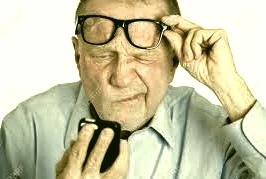As a child and teen, I had the strongest glasses of anyone I knew. I got gas permeable hard contacts at age 16, my parents hoping to stop the progression of my “galloping myopia”. Because these had an astigmatism correction too, they were weighted to stay in the same orientation and not rotate in my eyes.
Even though I considered my poor eyesight a defect, and felt guilty because my parents had to spend money on my glasses and contacts, I took a strange kind of pride in having such an extreme problem. It made me special. “Look at what I’m dealing with that others don’t have to!”, I thought, similar to the attitude someone in a wheelchair might have.

Back then I had no idea what astigmatism was, but this seemed to make me more unique — I wasn’t just plain old near-sighted! (To understand astigmatism better, read this.) Of course it’s human nature to want to feel special. However, I think taking too much pride in a trait you’d really like to change is sending the body mixed messages.
A good friend of mine, whom I actually met in the eye doctor’s office years ago, is almost as near-sighted as I used to be, about -9. When she told me she had beginning cataracts, she added that our holistic optometrist had suggested her myopia wasn’t enough to keep her from seeing, so now she might be resisting the clarity even more by developing cataracts!
This sounded harsh to me, but she seemed almost proud of her determination. I remembered she had told me that at an early visit to a different holistic vision doctor, she was proud of how hard her eyeballs were, like pumped-up muscles in the gym! Healthy eyeballs should be soft and moist and yielding. This felt similar to being proud of a vice, like how much alcohol you drank.
I am grateful for my challenges with vision. The ongoing process of healing it has taught me an enormous amount about myself. Yet being proud I’ve had this problem (even though I’ve significantly overcome it) feels wrong. It keeps me tied to the struggle, when I want to move past it! Vision improvement remains important to me, and I don’t want it to be my only focus (pun intended).
Life is to be enjoyed, and we’re here to learn and grow, not strive and suffer. I’m putting my attention on what’s going right, not what still needs to be fixed. I’ll probably always be working on improving my vision, even after I reach 20/20. I am proud I’ve improved as much as I have, and that I’m open to learning even more as I go forward.
get help on our Facebook Group!


I wore strong glasses, then contact lenses, from age 5 into my 40s. While making many mistakes, eventually l learned how to improve the way I use my eyes and to see in a more relaxed, healthy manner. It is my pleasure to coach others to do the same. Visit me at https://NancyLNeff.com.